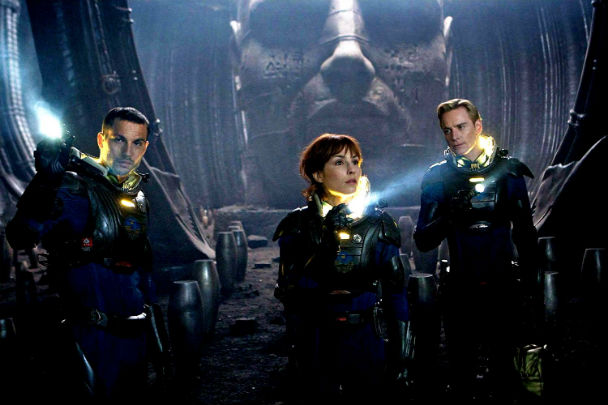Prometheus

(L-R) Charlie Holloway (Logan Marshall-Green), Elizabeth Shaw (Noomi Rapace) and David (Michael Fassbender)

Michael Fassbender. That’s it. That’s my review.
Well, fine. I suppose I should talk about the film. It opens on Earth, billions of years ago—lush vistas and waterfalls. As the myth goes, Prometheus, a Titan, stole fire from the gods and gave it to mankind. The film isn’t very clear about why its Prometheus defied his people but, accompanied by Marc Streitenfeld’s portentous score, the self-sacrificing alien’s marbled skin and Greek nose quite obviously imply something godlike. This alien ingests a toxic serum that breaks down his DNA and triggers panspermia. But just when you think that there would be a ten minute opening along the grand scale of Terrence Malick’s Tree of Life or Bob Zemeckis’ Contact, the film has to hurry itself along to the plot and the action—lest the studio gods be angered.
In 2089, two scientists, Elizabeth Shaw (Noomi Rapace) and Charlie Holloway (Logan-Marshall Green), come across cave paintings in the Isle of Skye, of similar artistic skill to those found in Lascaux. Certain markings in the paintings match those in other artwork found by their expeditions, funded by an eccentric billionaire (as there always tends to be in such movies) , Peter Weyland (Guy Pearce in horrible makeup). The crew spends two years in cryogenic stasis while in transit, which makes absolutely no sense given that their destination, Zeta Reticuli, is 39.5 light years away. At one point, Weyland’s daughter, Meredith Vickers (Charlize Theron), remarks, “We’re a half a billion miles from Earth.” That would place you near Jupiter, but I digress. Writers Jon Spaihts and Damon Lindelof have created a world in which DNA from a humanoid breaks down and forms similar—albeit shorter—beings four billion years later, one of which is a geologist, Fifield (Sean Harris) who gets lost in the very caverns he’s mapping out.
The entire structure of the story is a complete rehash of Ridley Scott’s 1979 horror film and James Cameron’s more action-driven sequel, made in 1986. A team of explorers is sent to a distant planet with an android programmed to carry out certain mission directives unknown to the others. The team encounters an alien species. The Weyland Corporation (later the Weyland-Yutani Corporation) has an ulterior motive. However, things do not go as planned.
Ms. Rapace’s Shaw has her faith tested by the theological implications of their discovery linking the ancient imagery with the otherworldly origins of life. In a way, she is Eve, whose transgression—taking from the Tree of Knowledge—may cost all of humanity. There’s a particularly gruesome scene involving reproductive rights. I’m likely not spoiling anything, then, by telling you that Shaw is infertile.
If, as Ms. Rapace has stated in interviews, Shaw is the heart of the movie, then David (Michael Fassbender) is the mind. While the crew hibernates on the trip, David, an android who doesn’t sleep and eats only to be social, preoccupies himself—playing basketball while riding a bicycle, watching Lawrence of Arabia, copying Peter O’Toole’s mannerisms. Here a great opportunity is wasted. Every scene with Mr. Fassbender is intriguing. For reference, he studied the character of Roy Batty (Rutger Hauer) from director Ridley Scott’s sci-fi cult hit, Bladerunner. However, if there’s also a bit of Douglas Rain’s calm psychopathy behind his impeccable mimicry of T.E. Lawrence, his isolation could have been explored throughout the second act. Mr. Scott seems to have forgotten, or willfully abandoned, the unsettling confinement that quietly built up terror in the original Alien.
Other tensions arise between Meredith and David, the “son” Weyland never had. David knows things she doesn’t. Despite her cold, business-focused demeanor, she harbors juvenile resentment toward her cybernetic brother. Sibling rivalry is yet another multidimensional theme, but none of the necessary character development is established to make us empathize with the conflict. Like Mr. Fassbender, Ms. Theron is an exceptional actor, and yet isn’t given much to do except hurl orders, scowl and tell David not to touch things.
Greco-Roman mythology is replete with themes of parental abandonment. David notes, “Don’t all children want their parents dead?” Was David being literal, or metaphorical?
The film, unfortunately, ignores the deeper implications dissected in Dr. Hobbe’s hypothesis in Steven Spielberg’s A.I.: Artificial Intelligence. In that film, one of the female researchers posits, if you create an artificial life that is capable of emotion, then what’s your responsibility to that individual? Dr. Hobbe replies, “But didn’t god create Adam to love him?” Does anyone read between the lines of Jesus’ outcry, “My god! My god! Why hast thou forsaken me?” Some theologists interpret the self-manifestation and sacrifice purely at face value—proof of god’s love.
I suppose that’s one way to read it. Another way to read it, below the surface, is that Jesus didn’t ask to be burdened with mankind and resents that his father put him up to it. In a Greek context, that isn’t a controversial read at all. The tragedy of this Prometheus is that it begins to ask huge questions, and then saves the answers for a sequel.
 Prometheus • Dolby® Digital surround sound in select theatres • Aspect Ratio: 2.35:1 • Running Time: 124 minutes • MPAA Rating: R for sci-fi violence including some intense images, and brief language. • Distributed by Twentieth Century-Fox
Prometheus • Dolby® Digital surround sound in select theatres • Aspect Ratio: 2.35:1 • Running Time: 124 minutes • MPAA Rating: R for sci-fi violence including some intense images, and brief language. • Distributed by Twentieth Century-Fox
Dolby and the double-D symbol are registered trademarks of Dolby Laboratories.